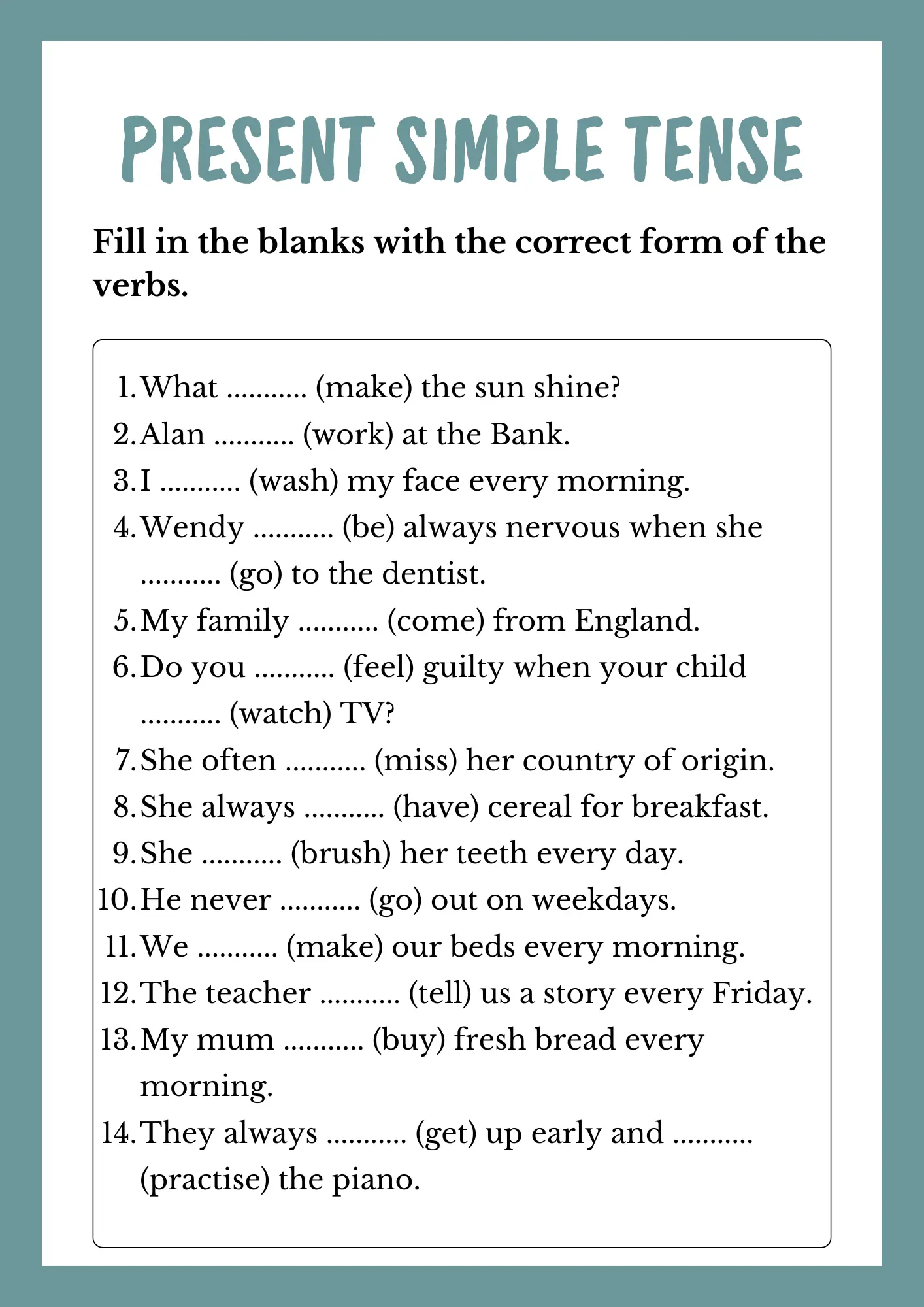These present simple exercises contain sentence completion, fill-in-the-blank, and multiple-choice questions to help you practise using the tense correctly in a sentence. You can also download a printable worksheet for extra practice at home or in a classroom.
1. Sentence completion exercise
Complete each sentence with the present simple form of the verbs in brackets.
1. She (go) to school every day.
The verb 'go' is an irregular verb. The correct answer is 'goes'.
2. They (play) soccer on weekends.
For plural subjects, we use the base form of the verb in the simple present tense. Thus, the correct answer is 'play'.
3. My brother (watch) TV every evening.
The correct answer is 'watches'. The subject, my brother, is in the third person singular. For verbs ending in -ch, we add -es in the simple present tense.
4. The government (make) new laws every year.
'Government' is a singular noun; thus, we use the verb form 'makes'.
5. My parents (work) in London.
'Parents' is plural, so the verb remains in the base form 'work'.
6. He usually (drive) to work.
'He' is third-person singular, so the correct form is 'drives'.
7. My sister (study) English at the University of Cambridge.
For verbs ending with 'y' after a consonant, we replace 'y' with 'ies'. Thus, 'studies' is the correct answer.
8. The children always (eat) breakfast at 7 am.
'Children' is plural, so the verb stays in the base form 'eat'.
9. Our teacher (speak) three languages.
'Teacher' is singular (third-person), so we use 'speaks'.
10. My aunt and uncle (live) in Scotland.
The subject 'my aunt and uncle' is plural, thus the verb form is 'live'.
2. Fill in the blanks exercise
Fill in the blanks with the correct form of the verb in parentheses.
Mia (work) for a social agency as a psychologist. She (have) a busy daily life. She is married to a medical doctor, and they (live) in Manchester, England. Every morning she usually (wake up) at six o'clock. She (check) her social media for about fifteen minutes. After that, she (get up), (make) her bed, and (tidy up) her room. Then she has a shower, (brush) her teeth, and (get) dressed. She (wash) her hair every other day. She has breakfast around eight o'clock. She (go) to work by bus. She (leave) home at a quarter to nine. Mia (be) very punctual. She always (arrive) at her office by nine o'clock. She (spend) about 20 minutes reading new e-mails and checking her schedule for the day. Every day, she (meet) with clients to help them cope with mental, emotional, and behavioural disorders. Her job (be) very demanding. It (be) emotionally stressful and physically exhausting.
Remember that in the present simple tense, we usually add '-s' or '-es' to the verb for third-person singular subjects (he, she, it). Other subjects use the base form of the verb. Be careful with irregular verbs like 'be', 'have', and verbs ending in '-y'.
3. Multiple-choice questions
Choose the correct form of the verb in the present simple tense.
1. She always ______ her homework before dinner.
2. They ______ to school every day.
3. My father ______ early on Sundays.
4. The teacher ______ us new vocabulary every Monday.
5. I usually ______ toast for breakfast.
6. We never ______ a mobile phone at school.
7. We ______ to church every Sunday.
8. She ______ very well in class.
9. My uncle ______ in a hospital.
10. My baby ______ a lot at night.

- What makes the sun shine?
- Alan works at the Bank.
- I wash my face every morning.
- Wendy is always nervous when she goes to the dentist.
- My family comes from England.
- Do you feel guilty when your child watches TV?
- She often misses her country of origin.
- She always has cereal for breakfast.
- She brushes her teeth every day.
- He never goes out on weekdays.
- We make our beds every morning.
- The teacher tells us a story every Friday.
- My mum buys fresh bread every morning.
- They always get up early and practise the piano.

